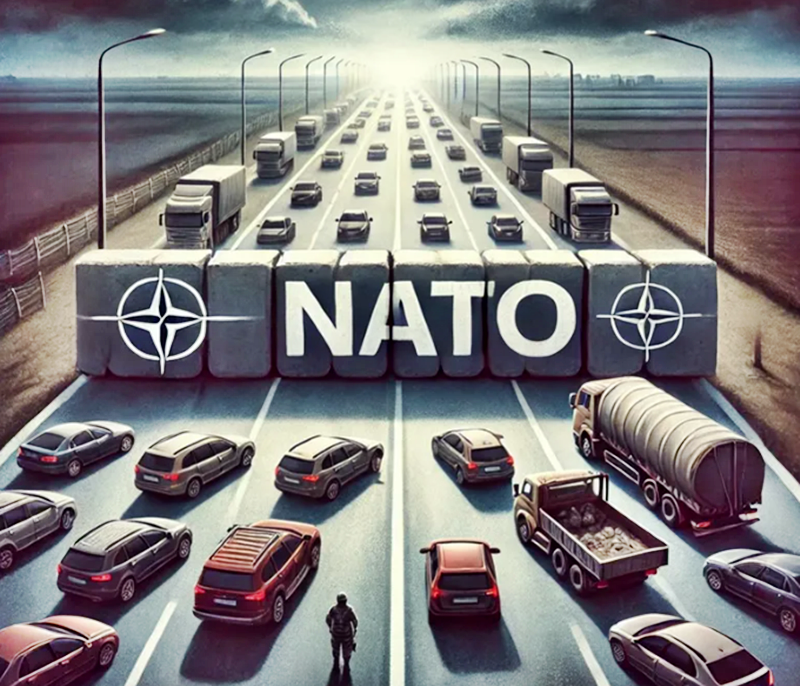Trump's maneuver to weaken BRICS backfires... Is he still trying to win over Russia to defeat China?

By derimot*no - Larry C. Johnson - 23 August 2025
I posted this image (below, ed.) of the press release announcing the upcoming meeting between the foreign ministers of Russia and India because it provides further evidence that Donald Trump's attempt to split BRICS is failing. And this is relevant in light of what has happened between Washington, Russia and the Europeans since last Friday's summit.
It’s true that Donald Trump succeeded in rekindling a friendly relationship with Vladimir Putin during the Alaska summit last Friday, and it’s clear that both men seem serious about keeping the lines of communication open. But questions remain about Trump’s real goals: Is Trump sincere in his desire to forge closer ties with Russia, or is he following the strategy outlined by A. Wess Mitchell — who is a friend of Deputy Secretary of Defense Elbridge Colby — in his August 2021 article in The National Interest : A Strategy for Avoiding Two-Front War ?

The core of Mitchell's argument is that the United States must convince Russia that China is the real enemy, and that the United States must secure Russia's cooperation in an American campaign to encircle China.
This is not just some random former US diplomat who thinks something… Mitchell has an impressive academic record and served as Assistant Secretary of State for European and Eurasian Affairs during Trump’s first term.
Mitchell currently heads a think tank, and from that position he was commissioned by the Pentagon’s Office of Net Assessment to write a longer version of this document, which was delivered to the Pentagon in the fall of 2020. In other words: Mitchell was asked to provide the US Department of Defense with a strategic vision for how to deal with Russia and China. I quote — forgive me for the long quote — the most significant parts of Mitchell’s document:
THE BIGGEST risk facing the United States in the 21st century, short of a direct nuclear attack, is a two-front war involving its strongest military rivals, China and Russia. (…) Given these high stakes, avoiding a two-front war with China and Russia must be among the foremost goals of today’s American grand strategy. (…)
Preventing such scenarios should not be just a concern of the US military; it is also the task of American diplomacy. Diplomacy in its highest form has historically been used for precisely this purpose: as an instrument for reorganizing power in space and time to avoid having to fight multiple enemies at once. This role — the sequencing of rivalries — should be the primary focus of American diplomacy today. (…)
While this task will not be easy, COVID-19 may provide an unexpected opportunity. By widening the power gap between China and Russia, the pandemic has intensified Russia’s economic dependence on China as a source of capital, markets, and international political support. Paradoxically, this increased dependence is likely to increase Russia’s fear of becoming a sidecar to Beijing’s ambitions, creating incentives for Moscow to reorient its foreign policy. (…)
Rather than trying to coax or win Russia into a conciliatory stance, we should present it with a combination of insurmountable obstacles to Western expansion (including, if necessary, inflicting on it a far more serious defeat than it has yet experienced in Ukraine), while offering new opportunities for cooperation, investment, and growth in Russia’s eastern regions. Simply put, the goal should be to solve America’s simultaneity problem by giving Russia incentives to be less of a European power—and more of an Asian one. (…)
The goal of our diplomacy toward Russia—and the core of our strategy for avoiding a two-front war—should be to sharpen Russia’s dilemma and ensure that, as its fears of China mature, it has viable foreign policy alternatives beyond aggression against the West. Such an approach would not operate on the premise that the United States can woo or win Russia into a conciliatory position. On the contrary, the premise is that if any reduction in tensions with Russia remains possible, it will be because Russian leaders—based on a cold assessment of their own interests—conclude that détente with the West serves their security needs better than their current, aggressive policies. (…)
The United States should want to see Russia suffer a military setback of such magnitude that it causes its leaders to reconsider their assumptions about the unproblematic nature of the post-Soviet space as a zone for strategic expansion. America can contribute to this outcome, much as it did in Afghanistan: by providing local actors with the means to resist Russia on a larger scale than they have done so far, and by encouraging European allies to do the same. We should also increase the cost of cyberattacks and other attacks on the United States, including through retaliatory attacks on Russian critical infrastructure and sanctions on Putin’s inner circle and the secondary market for Russian government bonds.
There you have it! The main reason for the war in Ukraine — provoked by the US — was to inflict a defeat on Russia that would force it to join “Team USA” and help America tame China. Although Mitchell is a smart guy, you can read for yourself that he completely underestimated the consequences of trying to isolate and weaken Russia.
Instead of convincing Putin to submit to Washington’s hegemonic leadership and reject closer ties with China, the opposite has happened… Russia and China now have closer economic, diplomatic, political, and military ties than ever before in the history of the two nations.
I must emphasize that a large part of the decision-makers in Washington are still convinced that Russia and China are not natural allies, and that the West can somehow provoke a “divorce” between the two. But Washington’s heavy sanctions against Russia, its massive support for Ukraine in the war against Russia, and aggressive threats against China have, as mentioned above, made the two close friends and allies.
You can also add India and Brazil to that list. A year ago, these two countries were not particularly enthusiastic about BRICS… now they are. Since Trump was sworn in as president in January, he has managed to create a common will and purpose among the BRICS countries.
Although Trump and his team are currently focused on brokering a peace deal between Ukraine and Russia, I don’t think they fully understand how complex this task is — nor do they seem to realize that the real issue Russia will insist on resolving is the threat NATO poses to Russia . Until this root cause is addressed, Russia will continue its war of attrition against Ukraine and continue inevitably westward toward Kiev.

Larry C. Johnson
The text represents the author's opinion, not necessarily that of www.derimot.no.
